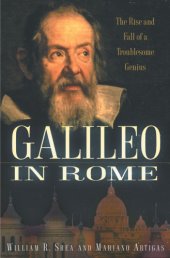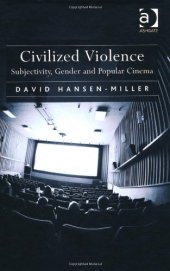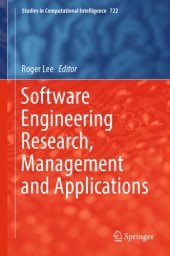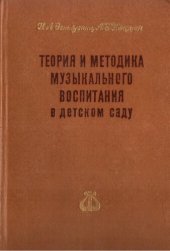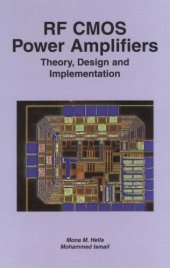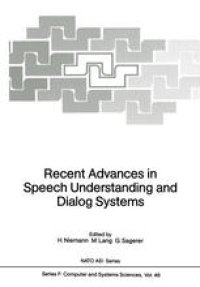
Ebook: Recent Advances in Speech Understanding and Dialog Systems
- Tags: Artificial Intelligence (incl. Robotics), Special Purpose and Application-Based Systems
- Series: NATO ASI Series 46
- Year: 1988
- Publisher: Springer-Verlag Berlin Heidelberg
- Edition: 1
- Language: English
- pdf
This volume contains invited and contributed papers presented at the NATO Advanced study Insti tute on "Recent Advances in Speech Understanding and Dialog systems" held in Bad Windsheim, Federal Republic of Germany, July 5 to July 18, 1987. It is divided into the three parts Speech coding and Segmentation, Word Recognition, and Linguistic Processing. Although this can only be a rough organization showing some overlap, the editors felt that it most naturally represents the bottom-up strategy of speech understanding and, therefore, should be useful for the reader. Part 1, SPEECH CODING AND SEGMENTATION, contains 4 invited and 14 contributed papers. The first invited paper summarizes basic properties of speech signals, reviews coding schemes, and describes a particular solution which guarantees high speech quality at low data rates. The second and third invited papers are concerned with acoustic-phonetic decoding. Techniques to integrate knowledge sources into speech recognition systems are presented and demonstrated by experimental systems. The fourth invited paper gives an overview of approaches for using prosodic knowledge in automatic speech recogni tion systems, and a method for assigning a stress score to every syllable in an utterance of German speech is reported in a contributed paper. A set of contributed papers treats the problem of automatic segmentation, and several authors successfully apply knowledge-based methods for interpreting speech signals and spectrograms. The last three papers investigate phonetic models, Markov models and fuzzy quantization techniques and provide a transi tion to Part 2 .
This volume contains invited and contributed papers presented at the NATO Advanced Study Institute on "Recent Advances in Speech Understanding and Dialog Systems" held in Bad Windsheim, FRG, July 5 to - 18, 1987. The subject of the book is a treatment of theoretical foundations and experimental results relevant for speech understanding and dialog systems. It becomes evident that signal processing and linguistic processing must be and can be combined in advanced speech understanding systems. Relevant topics ranging from speech segmentation and coding to knowledge-based understanding and dialog techniques are treated in depth in invited papers authored by internationally renowned researchers. Additional material is provided in contributed papers from leading experts in the field. The material of the book is organized in three parts, Speech Coding and Segmentation, Word Recognition, and Linguistic Processing. Topics covered are isolated word and continuous speech recognition, vector quantization, speaker independence, prosodic analyses of speech, hidden Markov models, syntactic, semantic, and pragmatic analysis of speech, the integration of linguistic knowledge into speech understanding, and dialog strategies. Possible applications are discussed in various papers.
This volume contains invited and contributed papers presented at the NATO Advanced Study Institute on "Recent Advances in Speech Understanding and Dialog Systems" held in Bad Windsheim, FRG, July 5 to - 18, 1987. The subject of the book is a treatment of theoretical foundations and experimental results relevant for speech understanding and dialog systems. It becomes evident that signal processing and linguistic processing must be and can be combined in advanced speech understanding systems. Relevant topics ranging from speech segmentation and coding to knowledge-based understanding and dialog techniques are treated in depth in invited papers authored by internationally renowned researchers. Additional material is provided in contributed papers from leading experts in the field. The material of the book is organized in three parts, Speech Coding and Segmentation, Word Recognition, and Linguistic Processing. Topics covered are isolated word and continuous speech recognition, vector quantization, speaker independence, prosodic analyses of speech, hidden Markov models, syntactic, semantic, and pragmatic analysis of speech, the integration of linguistic knowledge into speech understanding, and dialog strategies. Possible applications are discussed in various papers.
Content:
Front Matter....Pages I-X
Recent Advances in Speech Coding....Pages 1-23
Acoustic-Phonetic Decoding of Speech....Pages 25-49
Knowledge-Based Approaches in Acoustic-Phonetic Decoding of Speech....Pages 51-69
The Use of Prosodic Parameters in Automatic Speech Recognition....Pages 71-99
Prosodic Features in German Speech: Stress Assignment by Man and Machine....Pages 101-106
Recognition of Speech using Temporal Decomposition....Pages 107-110
Long Term Analysis-Synthesis of Speech by Non-Stationary AR Methods....Pages 111-115
Using Contextual Information in View of Formant Speech Analysis Improvement....Pages 117-122
A Speech Recognition Strategy Based on Making Acoustic Evidence and Phonetic Knowledge Explicit....Pages 123-128
On Finding Objects in Spectrograms: A Multiscale Relaxation Labelling Approach....Pages 129-133
Phonetic Segmentation Using Psychoacoustic Speech Parameters....Pages 135-139
Morphological Representation of Speech Knowledge for Automatic Speech Recognition Systems....Pages 141-146
Speaker-Independent Automatic Recognition of Plosive Sound in Letters and Digits....Pages 147-151
A Real-Time Auditory Model: Description and Applications in an ASR Acoustic-Phonetic Front End....Pages 153-157
A New Phonematic Approach to Speech Recognition....Pages 159-163
Primary Perceptual Units in Word Recognition....Pages 165-169
Context-Dependent Phone Markov Models for Speech Recognition....Pages 171-175
Speech Recognition Based on Speech Units....Pages 177-182
Mathematical Foundations of Hidden Markov Models....Pages 183-205
Computer Recognition of Spoken Letters and Digits....Pages 207-233
Recognition of Words in Very Large Vocabulary....Pages 235-254
Isolated Word Recognition Using Hidden Markov Models....Pages 255-259
Isolated Digit Recognition Using the Multi-Layer Perceptron....Pages 261-265
Use of Procedural Knowledge for Spoken Letters and Digits Recognition....Pages 267-271
Real-Time Large Vocabulary Word Recognition via Diphone Spotting and Multiprocessor Implementation....Pages 273-278
Speech Recognition With Difficult Dictionaries....Pages 279-283
Recent Results on the Application of a Metric — Space Search Algorithm (AESA) to Multispeaker Data....Pages 285-289
Robust Features for Word Recognition....Pages 291-295
Statistical Analysis of Left-to-Right Parser for Word-Hypothesing....Pages 297-303
Overview of Speech Recognition in the ‘SPICOS’ System....Pages 305-309
An Experimental Environment for Generating Word Hypotheses in Continuous Speech....Pages 311-316
Application of the Error Correcting Grammatical Inference Method (ECGI) to Multi-Speaker Isolated Word Recognition....Pages 317-321
Multi-Speaker Experiments with the Morphic Generator Grammatical Inference Methodology....Pages 323-327
A New Approach to Template Selection for Speaker Independent Word Recognition....Pages 329-333
Dynamic Spectral Adaptation of Automatic Speech Recognizers to New Speakers....Pages 335-338
Towards Speaker-Independent Continuous Speech Recognition....Pages 339-343
Evaluating Speech Recognizers and Data Bases....Pages 345-348
On-line Interpretation in Speech Understanding and Dialogue Systems....Pages 349-395
Semantic Processing in Speech Understanding....Pages 397-419
Knowledge Based Systems for Speech Understanding....Pages 421-458
Recognition of Speaker-Dependent Continuous Speech with Keal-Nevezh....Pages 459-463
Modification of Earley’s Algorithm for Speech Recognition....Pages 465-472
Expectation-Based Speech Recognition....Pages 473-477
Merging Acoustics and Linguistics in Speech-Understanding....Pages 479-484
Using Semantic and Pragmatic Knowledge for the Interpretation of Syntactic Constituents....Pages 485-490
Task-Oriented Dialogue Processing in Human-Computer Voice Communication....Pages 491-496
Experimentation in the Specification of an Oral Dialogue....Pages 497-501
Back Matter....Pages 503-525
This volume contains invited and contributed papers presented at the NATO Advanced Study Institute on "Recent Advances in Speech Understanding and Dialog Systems" held in Bad Windsheim, FRG, July 5 to - 18, 1987. The subject of the book is a treatment of theoretical foundations and experimental results relevant for speech understanding and dialog systems. It becomes evident that signal processing and linguistic processing must be and can be combined in advanced speech understanding systems. Relevant topics ranging from speech segmentation and coding to knowledge-based understanding and dialog techniques are treated in depth in invited papers authored by internationally renowned researchers. Additional material is provided in contributed papers from leading experts in the field. The material of the book is organized in three parts, Speech Coding and Segmentation, Word Recognition, and Linguistic Processing. Topics covered are isolated word and continuous speech recognition, vector quantization, speaker independence, prosodic analyses of speech, hidden Markov models, syntactic, semantic, and pragmatic analysis of speech, the integration of linguistic knowledge into speech understanding, and dialog strategies. Possible applications are discussed in various papers.
Content:
Front Matter....Pages I-X
Recent Advances in Speech Coding....Pages 1-23
Acoustic-Phonetic Decoding of Speech....Pages 25-49
Knowledge-Based Approaches in Acoustic-Phonetic Decoding of Speech....Pages 51-69
The Use of Prosodic Parameters in Automatic Speech Recognition....Pages 71-99
Prosodic Features in German Speech: Stress Assignment by Man and Machine....Pages 101-106
Recognition of Speech using Temporal Decomposition....Pages 107-110
Long Term Analysis-Synthesis of Speech by Non-Stationary AR Methods....Pages 111-115
Using Contextual Information in View of Formant Speech Analysis Improvement....Pages 117-122
A Speech Recognition Strategy Based on Making Acoustic Evidence and Phonetic Knowledge Explicit....Pages 123-128
On Finding Objects in Spectrograms: A Multiscale Relaxation Labelling Approach....Pages 129-133
Phonetic Segmentation Using Psychoacoustic Speech Parameters....Pages 135-139
Morphological Representation of Speech Knowledge for Automatic Speech Recognition Systems....Pages 141-146
Speaker-Independent Automatic Recognition of Plosive Sound in Letters and Digits....Pages 147-151
A Real-Time Auditory Model: Description and Applications in an ASR Acoustic-Phonetic Front End....Pages 153-157
A New Phonematic Approach to Speech Recognition....Pages 159-163
Primary Perceptual Units in Word Recognition....Pages 165-169
Context-Dependent Phone Markov Models for Speech Recognition....Pages 171-175
Speech Recognition Based on Speech Units....Pages 177-182
Mathematical Foundations of Hidden Markov Models....Pages 183-205
Computer Recognition of Spoken Letters and Digits....Pages 207-233
Recognition of Words in Very Large Vocabulary....Pages 235-254
Isolated Word Recognition Using Hidden Markov Models....Pages 255-259
Isolated Digit Recognition Using the Multi-Layer Perceptron....Pages 261-265
Use of Procedural Knowledge for Spoken Letters and Digits Recognition....Pages 267-271
Real-Time Large Vocabulary Word Recognition via Diphone Spotting and Multiprocessor Implementation....Pages 273-278
Speech Recognition With Difficult Dictionaries....Pages 279-283
Recent Results on the Application of a Metric — Space Search Algorithm (AESA) to Multispeaker Data....Pages 285-289
Robust Features for Word Recognition....Pages 291-295
Statistical Analysis of Left-to-Right Parser for Word-Hypothesing....Pages 297-303
Overview of Speech Recognition in the ‘SPICOS’ System....Pages 305-309
An Experimental Environment for Generating Word Hypotheses in Continuous Speech....Pages 311-316
Application of the Error Correcting Grammatical Inference Method (ECGI) to Multi-Speaker Isolated Word Recognition....Pages 317-321
Multi-Speaker Experiments with the Morphic Generator Grammatical Inference Methodology....Pages 323-327
A New Approach to Template Selection for Speaker Independent Word Recognition....Pages 329-333
Dynamic Spectral Adaptation of Automatic Speech Recognizers to New Speakers....Pages 335-338
Towards Speaker-Independent Continuous Speech Recognition....Pages 339-343
Evaluating Speech Recognizers and Data Bases....Pages 345-348
On-line Interpretation in Speech Understanding and Dialogue Systems....Pages 349-395
Semantic Processing in Speech Understanding....Pages 397-419
Knowledge Based Systems for Speech Understanding....Pages 421-458
Recognition of Speaker-Dependent Continuous Speech with Keal-Nevezh....Pages 459-463
Modification of Earley’s Algorithm for Speech Recognition....Pages 465-472
Expectation-Based Speech Recognition....Pages 473-477
Merging Acoustics and Linguistics in Speech-Understanding....Pages 479-484
Using Semantic and Pragmatic Knowledge for the Interpretation of Syntactic Constituents....Pages 485-490
Task-Oriented Dialogue Processing in Human-Computer Voice Communication....Pages 491-496
Experimentation in the Specification of an Oral Dialogue....Pages 497-501
Back Matter....Pages 503-525
....
